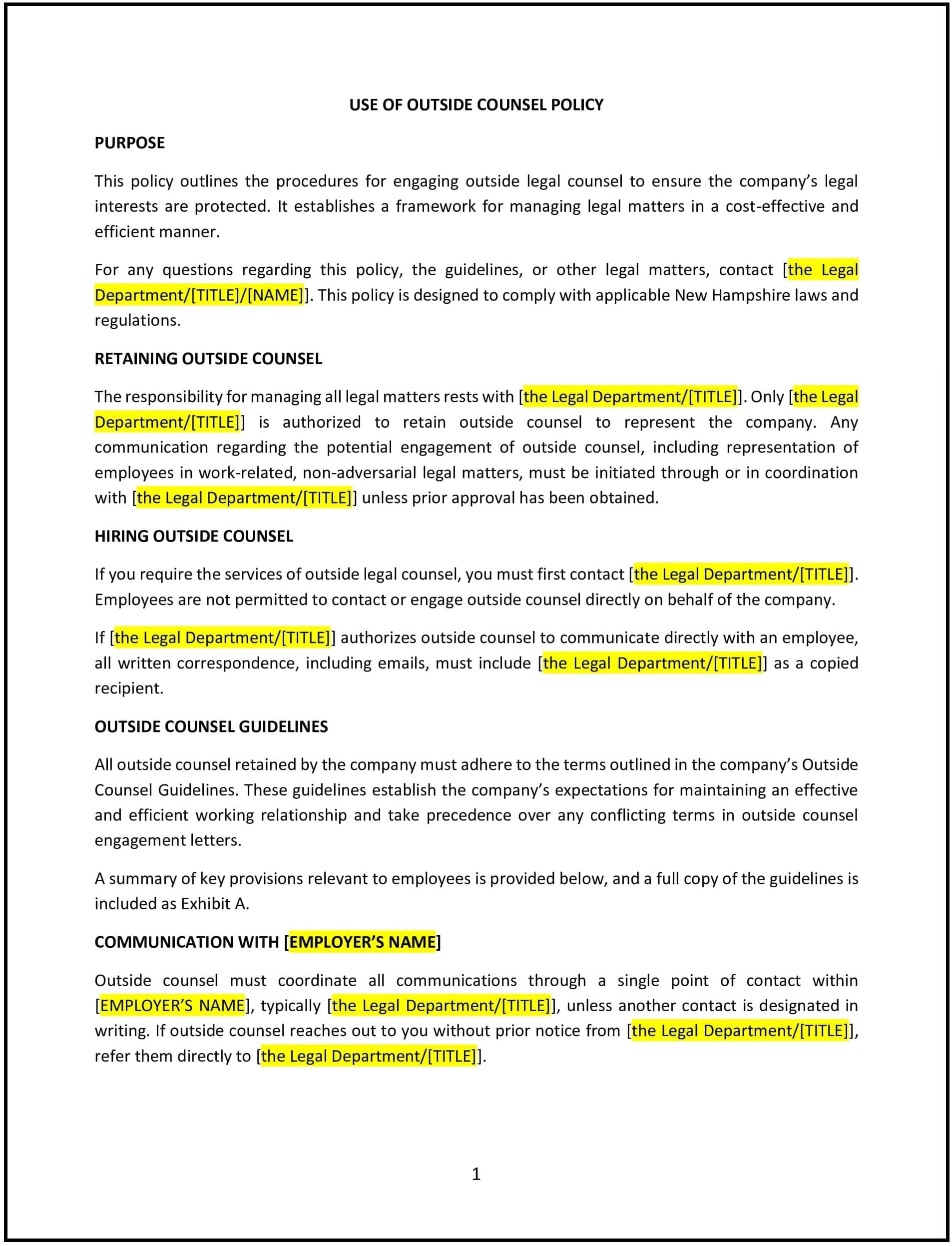Use of outside counsel policy (New Hampshire): Free template
Got contracts to review? While you're here for policies, let Cobrief make contract review effortless—start your free review now.

Customize this template for free
Use of outside counsel policy (New Hampshire)
A use of outside counsel policy helps New Hampshire businesses set clear guidelines for hiring and managing external legal service providers. This policy defines when and how outside counsel should be engaged, ensuring that legal services align with the company’s needs, budget, and values. It also outlines the responsibilities of internal teams and the process for selecting, compensating, and managing external law firms or attorneys.
By implementing this policy, businesses can ensure that they receive quality legal representation, control legal costs, and manage legal risk effectively.
How to use this use of outside counsel policy (New Hampshire)
- Define when to engage outside counsel: Specify the types of legal matters or issues that require the involvement of outside counsel, such as specialized legal needs, conflict of interest, or when internal legal resources are unavailable.
- Set approval process: Outline the approval process for engaging outside counsel, including who in the organization has the authority to hire external legal service providers.
- Establish selection criteria: Define the criteria for selecting outside counsel, such as relevant expertise, reputation, experience, and cost-effectiveness.
- Address billing and payment terms: Specify how outside counsel should bill the company, including hourly rates, flat fees, or alternative billing structures, as well as the process for invoice approval and payment.
- Set expectations for communication: Clarify how the internal team and outside counsel should communicate and collaborate throughout the legal process, including how often updates should be provided and the format for reporting progress.
- Establish confidentiality and conflicts of interest policies: Ensure that outside counsel understands their obligations regarding confidentiality, conflicts of interest, and the protection of sensitive company information.
- Define responsibilities for the internal team: Outline the role of the internal legal or management teams in overseeing outside counsel, including providing background information, coordinating efforts, and reviewing legal strategies and documents.
- Address the termination of outside counsel: Specify the conditions under which outside counsel can be terminated, including performance issues, failure to meet expectations, or changes in the company’s legal needs.
- Review and update: Periodically review and update the policy to ensure it remains in line with company objectives, legal best practices, and any changes in external legal service requirements.
Benefits of using this use of outside counsel policy (New Hampshire)
This policy provides several benefits for New Hampshire businesses:
- Reduces legal costs: By establishing clear guidelines for selecting and managing outside counsel, businesses can control legal fees, ensure transparency in billing, and avoid unnecessary costs.
- Increases efficiency: With a standardized process for engaging outside counsel, businesses can quickly and effectively address legal matters without delays or confusion.
- Ensures quality representation: Clear criteria for selecting outside counsel help businesses engage the best legal professionals for specific matters, ensuring high-quality legal advice and representation.
- Protects confidential information: The policy ensures that outside counsel is aware of and adheres to the company’s confidentiality standards, protecting sensitive business information.
- Improves oversight and control: By defining internal responsibilities and communication expectations, the policy ensures that outside counsel’s work is properly supervised and aligned with business objectives.
Tips for using this use of outside counsel policy (New Hampshire)
- Communicate the policy clearly: Ensure that key stakeholders, such as internal legal teams, management, and HR, are familiar with the policy and know how to engage outside counsel in compliance with company guidelines.
- Maintain good relationships: Foster strong, professional relationships with outside counsel, ensuring open communication and a mutual understanding of expectations.
- Regularly review billing: Keep track of outside counsel’s invoices, ensuring that they align with the agreed-upon terms and rates. If discrepancies occur, address them promptly.
- Seek alternative billing arrangements: If the company anticipates significant legal expenses, consider negotiating alternative billing arrangements, such as fixed fees or caps on hourly rates, to control costs.
- Ensure transparency: Maintain clear records of all interactions with outside counsel, including contracts, billing details, and communications, to ensure transparency and accountability.